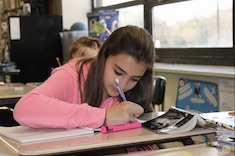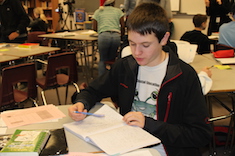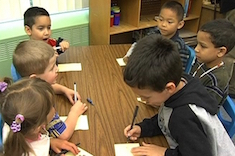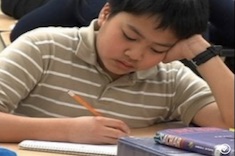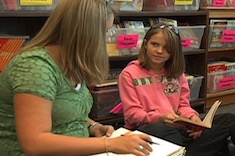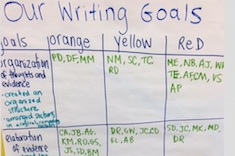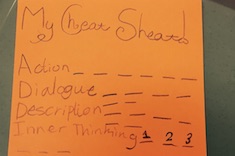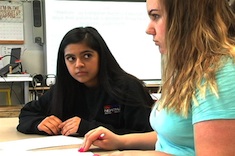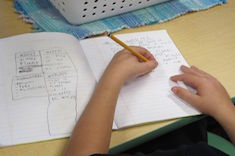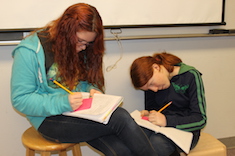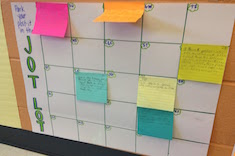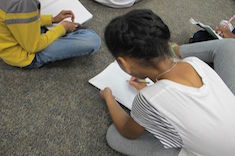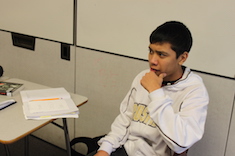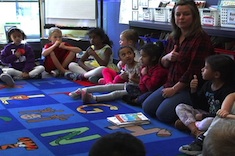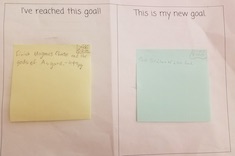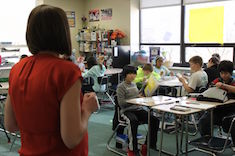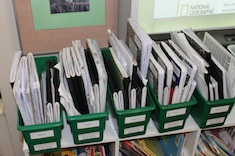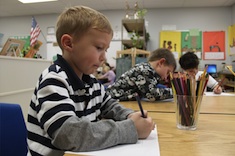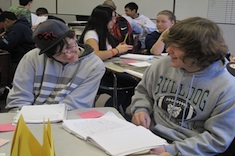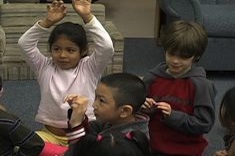Assessment Tools
Making sense of the enormous amount of student data in any classroom or school is probably the biggest challenge we face individually and in our school communities. Here you'll find everything from one-page templates created by teachers for use in their classrooms to videos of staff teams poring over large data sets. We don't have all the answers, but we do provide tools to help you ask better questions as you evaluate students and talk about assessments with your colleagues.
Latest Content
First-Grade Reflections: Looking Back to Move Forward
Bitsy Parks discovers that the best way to relaunch literacy workshops in January after holiday break is to have her first graders reflect on and celebrate what they learned in the fall with personal anchor charts.
Assessment Refresh
Christy Rush-Levine considers how her rubrics do not acknowledge different levels of support some students need to accomplish tasks. She rethinks her rubric design to include support, and in the process fosters more independence and reflection in students. Download the assessment rubric.
Resisting Rubrics
Matt Renwick explains why sometimes the best way to grow reading abilities in students is to resist rubrics.
Daily Reflection Rubric
Mark Levine always has a few students each year in his middle school classroom who are stunned by their poor grades, even when they clearly aren't meeting expectations. He develops a rubric to enable students to monitor and reflect on their learning behaviors daily.
Using Student Checklists in Literacy Intervention
Stephanie Affinito explains how to use student checklists in literacy intervention.
Assessment During On-Demand Writing
Tara Barnett and Kate Mills combine an engagement inventory and an on-demand writing assessment to get a full picture of skills and habits in their classroom community.
Super Teacher Reading Workshop
Mary Lee Hahn tries to be super teacher while she confers — juggling goals, assessments, notices and notes . . . and then it all comes crashing down. She shares what she learns from trying to do too much at once and failing.
The Scarlet Level
Stephanie Affinito tells everyone at a staff meeting to write their weights and ages on sticky notes so that she can post the numbers for the group to view. When teachers balk at the request, she has the perfect opening to discuss why focusing on levels in classrooms is a bad idea.
Practical Ways to Connect Students and Goals
Kate Mills and Tara Barnett provide some practical tips for connecting students and goals.
Student-Designed Development Cards
Melanie Meehan finds that student-designed development cards are a great way to get students invested in literacy goals.
Tapping into What Students Know
Melanie Meehan shares the value of assessing what students know first, and then tapping into this knowledge in new units.
Consistent Feedback in Writing Workshop
Carly Ullmer assesses how she can give consistent and meaningful feedback to every one of her many middle school students at least once a week.
Expert Students
Christy Rush-Levine uses a quick assessment during writing workshop conferences to connect expert students with peers who might need assistance. She includes a video example of the practice.
Assessing Instruction in the Midst
Melanie Meehan shares some ways teachers can press the pause button in the midst of teaching to assess whether they are teaching the right lesson at the right time.
Creating an On-Demand Writing Checklist
On-demand writing can be a stressful assessment task for students, but it does mimic the type of writing many adults face in their professional lives. Tara Barnett and Kate Mills work with students to create an on-demand writing checklist.
The Ins and Outs of Using a Jot Lot
Tara Barnett and Kate Mills use a jot lot to turn students’ notes on their learning into instructional plans and assessment.
Setting Weekly Goals
Tara Barnett and Kate Mills share the process of helping students set weekly goals and then reflect on their progress every Friday.
Quick Take: Evolving Beliefs About Goals
Gigi McAllister gives a brief explanation of how her thinking on goal setting has changed, as well as the ways she uses student goals to connect with parents.
The Daily Record
Mark Levine uses the “daily record” to encourage reflection throughout each day’s workshop in his social studies classroom.
Tracking Student Goals
Carly Ullmer transfers a messy goal-setting protocol to her seventh graders, and in the process finds they take on more accountability for individual success.
Minilesson: Measurable Reading Goals in Fourth Grade
Gigi McAllister has her fourth graders consider what makes a reading goal measurable.
Quick Reading Reflection in First Grade
Bitsy Parks has her first graders complete a quick reading reflection before a share session early in the school year.
Goal-Setting Ideas for Students
Melanie Meehan shares a wealth of ideas for better goal-setting with students.
Student (and Teacher) Risk-Taking
Carly Ullmer ponders what it means to take risks in her middle school classroom as she and her students experiment with different response options.
How to Keep Conferring Notes
Ruth Ayres shares her grid notes sheet, and takes teachers step-by-step through the process of using this assessment tool in conferences and instruction.
Finding Clues in Writing Folders
Katrina Edwards looks for clues in her first-grade students’ work and conferences to help them develop more writing stamina. She analyzes her notes to develop instructional plans.
The Value of Pre-Assessment
Melanie Meehan explains why a baseline assessment at the start of any writing unit is well worth the time.
Beginnings, Middles, and Endings: The Power of Baseline Assessments
Carly Ullmer shares how much her seventh-grade students learn from examining their own growth as writers with baseline, midpoint, and final assessments throughout the year.
Fostering Thinking Through Play
Katie DiCesare repurposes materials for her first graders to play with, and finds that encouraging play early in the year is a great tool for building reflection skills.
Writing for Reflection at the End of the Year
Katherine Sokolowski reflects on ways to extend the learning from an end-of-year activity all the way to the fall.
Browse Content By
Type
Category
- Assessment Tools
- Big Fresh Archives
- Booklists
- Choice Numeracy
- Classroom Design
- Common Core
- Community Building
- Conferring
- Content Literacy
- Digital Literacy
- English Language Learners
- Equity
- Family Relations
- Free Samples
- Guiding Groups
- Leadership
- Literacy Coaches
- Mentor Texts
- Minilessons
- New Teacher Mentors
- Podcasts
- Poetry
- Quote Collections
- Reading Strategies
- Self Care
- Struggling and Striving Learners
- Talking and Listening
- Teacher Study Groups
- Teaching Reading
- Teaching Writing
- Word Study and Vocabulary
Author
- Melissa Quimby
- Nawal Qarooni
- Gwen Blumberg
- Julie Cox
- The Lead Learners
- Hannah Tills
- Josie Stewart
- Ruth Metcalfe
- Mallory Messenger
- Becca Burk
- Jodie Bailey
- Vivian Chen
- Mary Brower
- Tiffany Abbott Fuller
- Stephanie Affinito
- Ruth Ayres
- Leigh Anne Eck
- Heather Fisher
- Shari Frost
- Julie Johnson
- Suzy Kaback
- Gigi McAllister
- Shirl McPhillips
- Melanie Meehan
- Cathy Mere
- Debbie Miller
- Tara Barnett and Kate Mills
- Tammy Mulligan
- Dana Murphy
- Bitsy Parks
- David Pittman
- Brenda Power
- Heather Rader
- Matt Renwick
- Mandy Robek
- Christy Rush-Levine
- Gretchen Schroeder
- Jen Schwanke
- Brian Sepe
- Katherine Sokolowski
- Stella Villalba
- Jennifer Vincent
Grade Level
Choice Literacy Membership
Articles
Get full access to all Choice Literacy article content
Videos
Get full access to all Choice Literacy video content
Courses
Access Choice Literacy course curriculum and training


